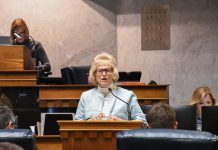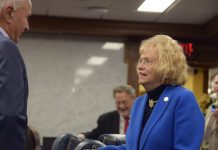Senator Introduces Bill To Fund Indy Eleven Stadium Proposal
A plan to fund a soccer stadium for the Indy Eleven took shape in legislation Tuesday with a proposal that could capture up to $11 million annually in tax revenue to pay off the bonds for the $150 million outdoor arena.
Senate Bill 543, authored by Sen. Jack Sandlin, R-Indianapolis, would create a new Professional Sports Development Area on an unspecified plot where developer Ersal Ozdemir—who owns the Indy Eleven—plans a $550 million, mixed-use project called Eleven Park. The residential and commercial parts of the project would be privately funded, but the bill would establish at least part of the public financing for the included stadium.
Introduced Tuesday, the legislation—which has been sent to the Senate Appropriations Committee for consideration—would create a sports development area to encompass the larger Eleven Park development and would be in place for at least the next three decades.
The PSDA could capture up to $11 million in tax revenue per year for 32 years—money that would be paid by the businesses, residents and even athletes living or working at Eleven Park. That revenue would be diverted to the Capital Improvement Board—which would own the 20,000-seat stadium, but not the private development surrounding it—for the purpose of paying for the public infrastructure.
Initially, the stadium and the rest of the public development (including a plaza and underground parking garages) would be paid for using city-issued, developer backed bonds, with any funding gaps in financing covered by Indy Eleven’s ownership group.
Because Ozdemir has not yet said where it plans to place the development—though multiple sites have been discussed by those familiar with the team’s plans—the legislation does not lock in a location for the PSDA.
A spokesman for the proposed Eleven Park development issued a statement late Tuesday calling the proposal “a creative, taxpayer-friendly public-private partnership” that would not require state or local governments to spend tax revenue they already are receiving. “Eleven Park will continue to work with all stakeholders, including Sen. Sandlin and other supportive policy makers to support this piece of legislation or other legislative pathways that will make this transformative neighborhood development a reality.”
The bill places conditions on the development of the Eleven Park site and the structure of any lease agreements between CIB and Indy Eleven or other major stadium tenants, chief among them the length of such a lease and future improvements to the facility.
The CIB would not be able to secure a lease with Indy Eleven that exceeds 40 years. Standard venue lease deals for sports teams—including one being floated for the Pacers by state lawmakers—are generally 25 to 30 years long. The CIB also could not charge lease rates to Indy Eleven or other tenants until construction is completed. While Ozdemir last week said the team would be willing to pay all operating costs for the stadium, the legislation puts that commitment in writing, giving the CIB discretion in determining what group is responsible for operations.
The bill also predicates that other uses for the stadium outside of housing Indy Eleven would be permitted, at the discretion of the CIB. While it is not clear at this point whether Indy Eleven would receive a cut of the funds from events held at the stadium—the Colts and the Pacers both do for most other events at their respective venues—that detail is expected to be ironed out if the sides sit down to discuss a long-term lease deal.
CIB President Melina Kennedy said neither she nor the board’s counsel has had an opportunity to review the legislation. The CIB did not have a role in drafting the bill, she said.
“We’ve given Indy Eleven our thoughts on what we would support,†she said, noting that if the bill is consistent with those considerations, the CIB would line up behind the bill.
Before construction on the stadium and other public infrastructure could begin, the CIB would be required to undergo a public process and put the project out to bid to interested parties. While the legislation makes no provisions for the potential involvement of Keystone Corp., a development firm owned by Ozdemir, companies that are perceived to have a conflict of interest are generally not permitted to participate in public bids.
Sandlin’s bill was introduced the same day that Senate Appropriations Chairman Ryan Mishler introduced Senate Bill 7, which would increase funding for the CIB as part of a long-term plan to improve its existing facilities, including the Indiana Convention Center and Bankers Life Fieldhouse. Sandlin said he would not be surprised if his proposal is merged into the Mishler’s bill and is hopeful about its prospects for passage.
Kennedy said last week that any stadium deal for Indy Eleven will require a private investment element to accompany and offset the use of public dollars at the site. She said she likes the general concept of Eleven Park as it has been presented and is continuing to work with the team on details related to the project.
In 2015, Indy Eleven proposed a standalone stadium that would have cost taxpayers $87 million. Legislation for that project was also introduced in the General Assembly and passed an initial vote, before ultimately dying. The team rejected an option that would have seen an extensive renovation to Michael A. Carroll Stadium on the IUPUI campus, its home at the time.





Once again take Indiana tax $$ and divert it to Indianoplace.
Comments are closed.